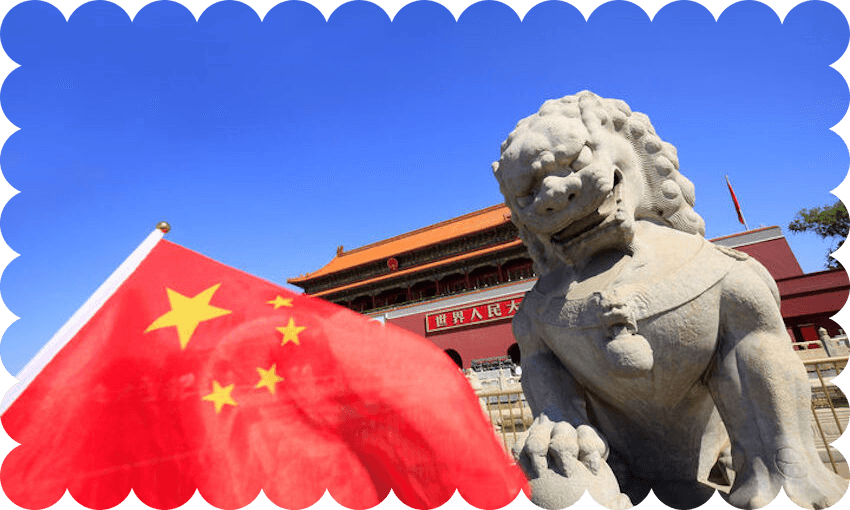Not many of us trust Beijing to act responsibly in the world – but we still really want Chinese yuan.
Less than a week out from prime minister Chris Hipkins’ visit to China — the first visit to our largest trading partner for a New Zealand prime minister since Jacinda Ardern’s 2019 trip — New Zealanders’ attitudes towards China remain mixed.
The key takeaways from the Asia New Zealand Foundation’s latest Perceptions of Asia and Asian Peoples survey show a continuing downward trend in New Zealanders viewing China as a friend, though perceptions have warmed since mid-2022 when China made assertive moves in the Pacific.
According to the survey, more New Zealanders (37%) view China as a “threat” than a “friend” (30%). Only Russia and North Korea were ranked as bigger threats, with 72% and 69% of Kiwis identifying the two countries as threats to New Zealand. Also consistent with previous recent surveys, New Zealanders have once again named Japan, Singapore and South Korea as our best friends in the region. These results, which are drawn from data collected in November 2022, are broadly in keeping with findings from 2021.
Not only do New Zealanders view China as a threat, they also see it as one of the least “trustworthy” major powers, with only 13% of respondents expressing having trust in China to ‘act responsibly in the world’. The statistic should be a cause for concern to policymakers in Beijing, says Jason Young, director of the New Zealand Contemporary China Research Centre at Te Herenga Waka. “I would hope that [Beijing] would reflect on that in the sense of maybe changing some of their behavior in the [Pacific] region.”
By contrast, New Zealanders see the United Kingdom and Japan as the most trustworthy major powers, with over 55% of respondents expressing “very high” or “high” trust in each of the two. These were followed by France, Germany and the United States.
While Perceptions of Asia surveys have shown a steadily downward trend in New Zealanders’ attitudes towards China since 2020, the most recent survey shows that public sentiment has, at least, warmed somewhat since a significant dip in mid-2022. The Asia New Zealand Foundation June 2022“mini-poll” found that only 13% of New Zealanders saw China as a friend, while 58% viewed it as a threat.
Jason Young points out that the survey does not go into detail on why New Zealanders’ impressions have shifted, but speculates that China’s actions in the South Pacific – including foreign minister Wang Yi’s Pacific tour and the signing of various agreements with Pacific nations, particularly a security agreement with the Solomon Islands – in the first half of last year could likely provide some explanation for the June 2022 souring.
Although perceptions of China may have bounced back somewhat since this time last year, the general downwards trend remains clear. Also significant, almost two thirds of New Zealanders are at least “fairly concerned” about the potential for conflict over Taiwan, with 30% of Kiwis reporting to be “very” or “extremely” concerned.
Despite Kiwis’ concerns about China, the country still easily tops the list of the “most important” Asian countries for New Zealand’s future, with 72% of participants deeming it most important, followed by Japan (66%), Singapore (53%) and India (52%).
When asked what single country New Zealand should invest more energy and resources in building a stronger relationship with, China was second only to Australia, with 90% of those supporting stronger ties with China pointing to trade and economic opportunities. The United States came in third, with 84% noting its importance for security ties.
The vast majority of those surveyed are also supportive of building New Zealanders’ Asia capability, with 79% agreeing that it is important for New Zealand students to learn about Asia, including Asian languages – a finding of particular interest given recent announcements that Te Herenga Waka and University of Otago intend to cut jobs and courses across their languages departments.
So what do New Zealanders’ mixed feelings mean for the prime minister’s upcoming China visit?
With New Zealanders making clear the importance they place on building trade and economic ties with China, it is not surprising that official communications have emphasised that the visit is a business trade delegation, and will actively promote New Zealand’s Covid-19-hit education and tourism sectors. Young notes that framing the trip in this way increases the chances it will be largely supported by New Zealanders.
Young is quick to point out that while it is a good thing that New Zealanders are keen to see investment in growing our Asia and China capability, they may be viewing China through narrow economic lens. “It could be as simple as they think it’s important because they [China] buy our commodity exports. If that’s the answer, then I think that that’s a pretty shallow and superficial way of thinking about an important country.”
However, perhaps in acknowledgement of New Zealanders’ growing China concerns, Hipkins’ press release also notes that he intends to discuss climate change, human rights and regional security when meeting with president Xi Jinping and premier Li Qiang next week.





